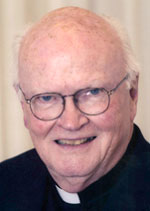In the self-revelatory interview of Pope Francis published by several Jesuit journals around the world in September 2013, the Holy Father mentioned that he had read Alesandro Manzoni’s 1828 novel “The Betrothed” three times and had it on a nearby table for a fourth reading whenever the opportunity presented itself. Three times and looking forward to a fourth — that’s a recommendation to be taken seriously. It prompted me to pick up the book and give it a read; one way, I thought, of getting inside the mind of this fascinating pope.
The point of mentioning this here is not to repeat the recommendation. It is not an easy read — 605 pages that tell a long and involved love story in a Catholic world that no longer exists and takes the reader through war and plague and emotional hardship on the way to a happy ending. Manzoni (1785-1873) was the principal novelist of 19th-century Italy and this work is considered the greatest Italian novel of modern times.
The troubles of the betrothed peasant couple, Renzo and Lucia, are rooted in the cowardice of a parish priest who is intimidated by a local baron who has his lustful eye on the innocent Lucia and forces the timid priest to delay the marriage.
[hotblock]
A confrontation (a few hundred pages later) between the comfort-seeking, self-serving priest and his cardinal may provide the key to the obvious fascination Pope Francis has with this story.
“Father, why did you not marry that poor girl Lucia to her betrothed?” The question drew stammers, evasions, and nothing that could serve as a defensible answer, even the admission that the baron’s opposition “forbade me to carry out the marriage under pain of death.”
“And does that seem a sufficient reason to you not to carry out a definite duty?” replied the cardinal, who goes on to say: “[D]on’t you realize that suffering for the cause of justice is our way of conquering? If you do not know this, what is it you preach? What are the good tidings you have to announce to the poor? Does anyone expect you to conquer might by might? You will certainly never be asked one day if you have managed to check the strong; for you were not given either the mission or the means for that. But you will assuredly be asked if you have used the means you had at your disposal to do what was prescribed, even when anyone was rash enough to try and stop you.”
“And why … have you bound yourself to a ministry which pledges you to a continual struggle with the passions of the world? … [W]hy … have you forgotten that whenever you need courage to carry out your obligations in this ministry, however you started in it, there is One who will give it infallibly to you if you but ask for it? Do you think that all those millions of martyrs were courageous by nature?”
As I said, I thought that by reading this book, I might get a glimpse into the mind of Pope Francis. I think I did.
***
Jesuit Father Byron is university professor of business and society at St. Joseph’s University, Philadelphia. Email: wbyron@sju.edu
PREVIOUS: An example of a poverty that frees us
NEXT: Exploring solutions to stop the abuse of alcohol and other drugs




Great book. I didn’t know the Pope was a fan. I disagree with Father’s statement that it is a difficult read however, it is quite gripping if you have a bit of imagination for the Catholic culture that it depicts.